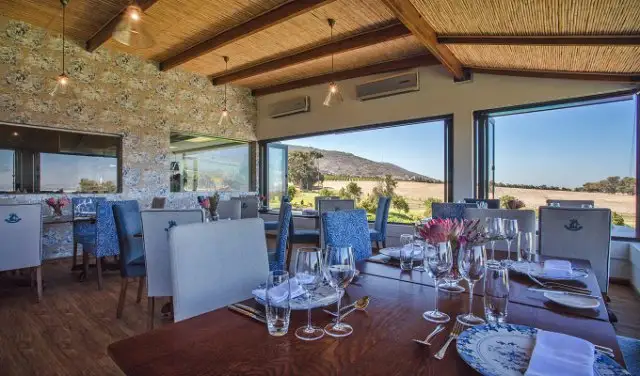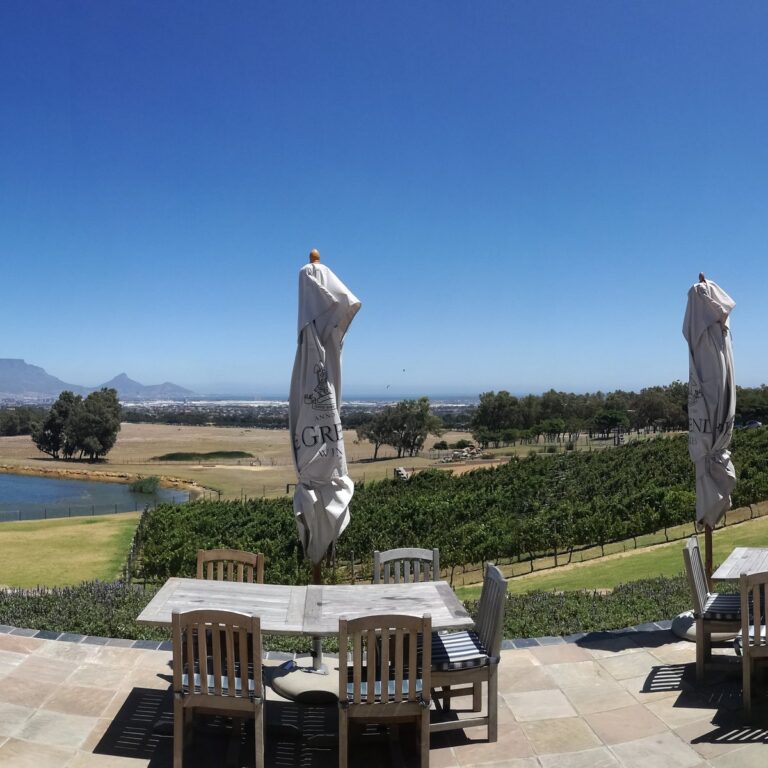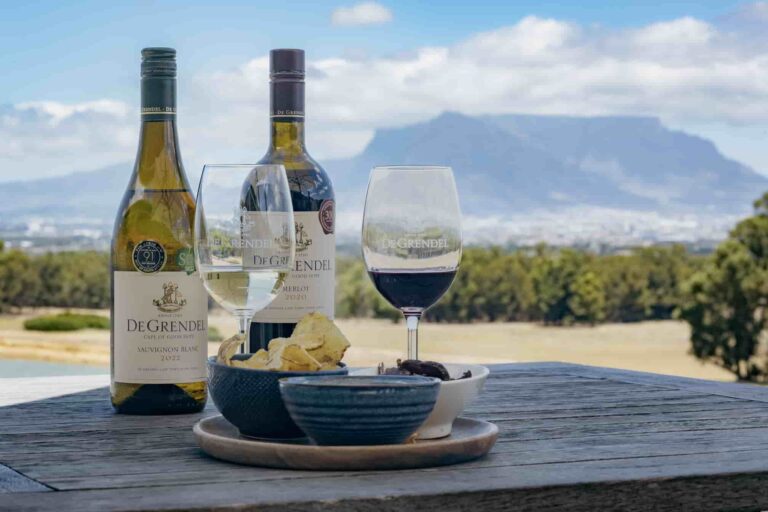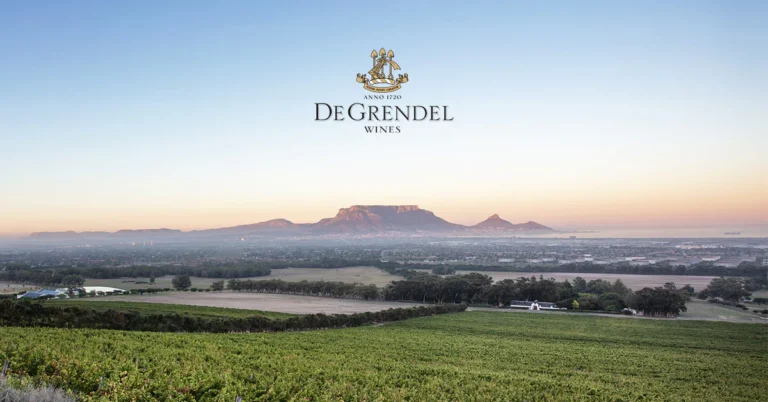De Grendel Wine Estate: A Durbanville Legacy of Elegance and Innovation
As I drove up the winding road to De Grendel Wine Estate, the fynbos-covered slopes of Tygerberg Hill parted to reveal a postcard-perfect panorama: Table Mountain in the distance, Cape Town’s skyline shimmering below, and the Atlantic Ocean’s cool breezes whispering through the vineyards. For a wine enthusiast writing for CapeVineMaster.co.za, visiting De Grendel was like stepping into a blend of history, nature, and world-class winemaking. Just 15 minutes from Cape Town’s city center, this family-owned estate, rooted in a 300-year legacy, offers a serene escape with wines that have earned global acclaim. From its storied past under the Graaff family to its meticulously crafted vintages and a tasting room that feels like a front-row seat to paradise, De Grendel is a Durbanville gem—though a few rough edges could use polishing. Join me as I uncork the estate’s story, its vines, its wines, and the experiences that make it a must-visit.
A Heritage Forged in Vision
De Grendel’s story begins in 1720, when Danish settler Claas Mayboom received the land from Governor van der Stel, naming it “De Grendel,” meaning “latch” or “lock” in Dutch—a nod to its role as a gateway for travelers heading inland. In 1891, Sir David Pieter de Villiers Graaff, a visionary businessman and politician, purchased the 330-hectare estate to stable his prized Arab horses, acquired in Argentina. The Tygerberg’s dry, elevated slopes proved ideal, unlike the wet climate of his Newlands home. For over a century, De Grendel thrived as a dairy farm and livestock haven, with sheep, cattle, and later wildlife like springbok and eland.
It wasn’t until 1999, when Sir David Graaff (3rd Baronet) retired from politics, that De Grendel embraced winemaking. Inspired by his studies in Grenoble, France, and a family friend’s recognition of Durbanville’s potential, he planted the first 10 hectares of Cabernet Sauvignon and Merlot in 2000. By 2003, the first vintages were released, and today, 110 hectares are under vine, managed by Sir De Villiers Graaff (4th Baronet). Winemaker Charles Hopkins, a Cape Winemakers Guild member lured from Graham Beck in 2005, designed the state-of-the-art cellar, blending science and artistry. The Graaffs’ commitment to sustainability—preserving Renosterveld vegetation and earning WWF Biodiversity and Wine Initiative status—adds depth to their legacy. My only critique? The estate’s rich history could be better shared; a guided museum or historical display would bring the Graaff saga to life.
Vineyards and Varieties: Terroir at Its Finest
Perched 350 meters above sea level, De Grendel is unique among Cape vineyards, boasting sea views, cool ocean breezes, and misty nights—the “holy triumvirate” of winemaking. Its well-drained, yellow shale soils, occasionally snow-dusted in winter, create a terroir ideal for Sauvignon Blanc and Pinot Noir, though the estate excels across varietals. The vineyards, planted after an exhaustive terroir study, benefit from Durbanville’s cool climate, with some Cabernet Sauvignon sourced from Firgrove, 6 km from False Bay, for added complexity.
The key grape varieties include:
- Sauvignon Blanc: Crisp and vibrant, a Durbanville hallmark.
- Chardonnay: Elegant and oak-kissed, from the Op Die Berg range.
- Pinot Noir: Silky and cherry-driven, a newer treasure.
- Merlot: World-class, with rich berry notes.
- Shiraz: Bold and spicy, a crowd-pleaser.
- Cabernet Sauvignon, Petit Verdot, Cabernet Franc: Core components of the flagship Rubaiyat blend.
- Pinot Gris: A niche white with floral charm.
- Viognier: Aromatic, used in the Winifred blend.
With 110 hectares under vine, plus blueberries and livestock, De Grendel is a working farm that balances agriculture and conservation. Hopkins’ low-yield approach ensures concentrated fruit, hand-harvested for quality.
The Wines: A Symphony of Craft
De Grendel’s portfolio, crafted by Charles Hopkins and his protégé Morgan Steyn, is a masterclass in precision, with wines earning accolades like the International Wine & Spirit Awards gold for Rubaiyat. The estate offers a range of reds, whites, and sparkling wines, with the flagship Rubaiyat—a Bordeaux-style blend—named after a Persian poem cherished by the Graaffs. Here’s what I tasted:
- Koetshuis Sauvignon Blanc 2024: Crisp pineapple, apricot, and sea kelp with creamy lees depth. A standout, though it could evolve with more bottle age.
- Op Die Berg Chardonnay 2023: Buttery with citrus and oak, elegant but slightly heavy-handed on wood for my taste.
- Rubaiyat 2020: A deep ruby blend (70% Cabernet Sauvignon, 25% Petit Verdot, 4% Merlot, 1% Cabernet Franc) with blackcurrant, cedar, and mocha. World-class but needs time to soften.
- Pinot Noir 2022: Cherry-rich and buttery, with Top 100 SA Wines status. Youthful and vibrant, though less complex than coastal peers.
- Merlot 2021: Gem-like ruby with aniseed and berry aromas. A favorite for its balance, though it could use more intensity.
- Proposal Hill Pinot Noir Brut Rosé: Salmon-hued with strawberry and brioche. Festive but slightly overshadowed by the MCC Brut’s apple-driven fizz.
- Noble Late Harvest Sauvignon Blanc: Honeyed and lush, perfect with dessert, though its sweetness may not suit all.
- Winifred (Chardonnay, Sauvignon Blanc, Viognier): Floral and refreshing, but the blend feels less cohesive than single varietals.
Priced from R100 (Sauvignon Blanc) to R500 (Rubaiyat), the wines offer value, with cellar-door discounts for Loyalty Club members (free with an 18-bottle purchase). My critique? Some whites lean heavily on oak, masking fruit purity, and the Winifred blend could be tighter. The estate’s organic wine experiments, noted during a cellar tour, are promising but not yet widely available.
The Tasting Room: A View to Remember
The tasting room, housed in a modern building with colonial echoes, is a highlight, offering panoramic views of Table Mountain, Cape Town, and the Atlantic from its glass-encased verandah. Open daily (9am–5pm, Sundays 10am–4pm, pre-booking essential), it’s elegant yet relaxed, with a lounge area and stoep perfect for soaking in the scenery. The standard tasting (R100, six wines) includes two whites, a rosé, two reds, and a dessert wine, while the flagship tasting (R150) focuses on premium labels like Rubaiyat. Snack platters (cheese, charcuterie) are available, though pricier than expected (R200+).
My premium tasting, guided by the knowledgeable Simeon, was a delight, with the Rubaiyat paired with a biltong bite stealing the show. Staff like Mikyle Rodrigues and Lutho shine, offering insights into winemaking, but on busy days, the room can feel crowded, and service slows. Some visitors report inconsistent experiences, with one citing poor shade on a hot day and “below-average” wines, though my tasting was stellar. The shop offers wines at cellar-door prices, but difficulties with international shipping, as noted by a reviewer, could frustrate overseas buyers. A tapas menu on select days adds flair, but I wished for more curated food pairings to elevate the experience.
Activities to Savor at De Grendel
De Grendel is a destination for wine lovers and nature enthusiasts, with activities that highlight its heritage and biodiversity:
- Wine Tastings: Standard and flagship tastings are the core, with pre-booking essential (restaurant@degrendel.co.za). The verandah’s views are unmatched, but indoor seating lacks the same wow factor.
- De Grendel Restaurant: Led by Chef Ian Bergh, this award-winning eatery (World Luxury Restaurant Awards 2016) serves contemporary Cape cuisine, like springbok loin or linefish, paired with wines at cellar-door prices. My three-course lunch (R475) was exquisite, though slow service on a busy Sunday was a hiccup. Open Thursday–Sunday (lunch 11:30am–2:30pm, dinner Wednesday–Saturday 6pm–9:30pm).
- Farm Tours: A one-hour tour (R150, daily, 24-hour booking required) with guide Douglas Swanson explores the farm’s history, wildlife (eland, springbok), and organic plots. It’s engaging, but scheduling can be rigid.
- Farm Tour with Picnic: Available Wednesday–Sunday (R500 for two), this includes a tour and a picnic with charcuterie, cheeses, and a bottle of wine. The dam-side setting is idyllic, but more shaded spots would improve comfort.
- Cellar Tours: Offered by winemaker Morgan Steyn, these dive into the winemaking process, with tastings of barrel samples like the Baronet (R1500/bottle). Informative but limited to small groups, so book early.
- Wildlife and Scenery: The estate’s 330 hectares host antelope, sheep, and a dam, with Renosterveld conservation areas. Informal walks are possible, but guided eco-tours would enhance the experience.
- Events: The estate hosts occasional dinners and tastings, like the Easter Puff Pastry Bunnies event, adding whimsy. Check degrendel.co.za for updates.
The estate’s carbon-negative status and stormwater-capturing drains are eco-highlights, though not emphasized enough for visitors. It’s less family-friendly due to its elegant vibe and lack of kids’ facilities, making it ideal for couples or small groups.
A Positive Yet Critical Review
De Grendel Wine Estate is a Durbanville triumph, blending a 300-year legacy with wines that rival the Cape’s best. The Rubaiyat and Koetshuis Sauvignon Blanc are world-class, and the restaurant’s Cape-inspired dishes elevate every sip. The tasting room’s views are unmatched, and farm tours with Douglas offer a deep dive into the Graaffs’ story. The estate’s sustainability—carbon-negative, Renosterveld preservation—sets a high bar, and Charles Hopkins’ mentorship of young winemakers adds heart.
However, there’s room for refinement. The tasting room can feel cramped on busy days, and inconsistent service or shade issues, as some visitors noted, detract from the polish. Food pairings are limited, and the cheese platters are overpriced for their size. International shipping woes and occasional stock shortages frustrate buyers. The wines, while exceptional, could dial back oak in some whites for fresher fruit. Adding guided eco-tours or a historical exhibit would deepen the experience, and more flexible tour scheduling would help.
Final Thoughts
My visit to De Grendel was a love letter to Durbanville’s terroir, leaving me with a bottle of Merlot, a full belly from the restaurant, and memories of Table Mountain’s silhouette. The estate’s blend of heritage, innovation, and jaw-dropping views makes it a standout, whether you’re sipping Rubaiyat on the verandah or spotting springbok on a farm tour. Just 20 minutes from Cape Town, De Grendel is a serene escape for wine lovers and view-chasers alike. Book your tasting, request a window seat, and raise a glass to a legacy that’s as enduring as Tygerberg’s slopes. De Grendel isn’t just a winery—it’s a Cape treasure.
Plan your visit at DeGrendel.co.za and join CapeVineMaster.co.za’s monthly tastings for more wine adventures!







